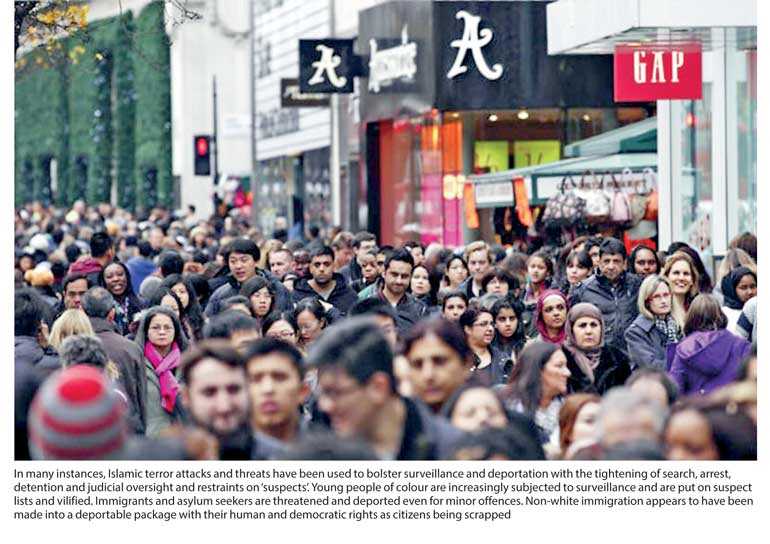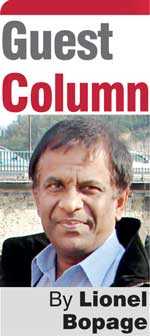Saturday Mar 15, 2025
Saturday Mar 15, 2025
Wednesday, 6 June 2018 00:00 - - {{hitsCtrl.values.hits}}

 Far right in Europe
Far right in Europe
Throughout Europe, racialist groups have used the war on terror to create new racist mono-cultural political platforms. With the collapse of the Soviet bloc in the nineties, uncertainty reigned for some time as free markets expanded and some aspects of bourgeois democratic institutions were established. A neo-liberal social development model started expanding horizontally sweeping through Central and Eastern Europe and was accompanied by structural reforms of economic liberalisation and globalisation.
A quarter century later, right wing populist currents gained ground in Hungary and Poland and then spread into France, the Netherlands and the United Kingdom. In the past decade, new right-wing movements have developed into coalitions between Neo-Nazis and the free-market advocates. In a way, this has brought a superficial normalcy to the right wing fascist ideologies in some parts of Europe and they have even gained more electoral grounds. In countries like Poland and Hungary, such right-wing forces are in power. They used national security as a political platform for introducing racism and introduced systemic intolerance by restructuring education, immigration, and the judiciary.
In Italy, a populist anti-establishment Five Star Movement (M5S) that contested the March 2018 Parliamentary elections under the slogan “Participate, Choose, Change” and a regionalist populist League that contested under the slogan “Italians First” formed an alliance this month to form government. The election environment also focused on the apparently irreversible decline of economy, persistent high unemployment and corruption.1 The campaign of M5S was focussed on anti-corruption and a proposed Universal Basic Income (UBI) for all. The League was an anti-immigrant and anti-EU party like the National Front in France or United Kingdom Independence Party (UKIP) in Britain. It was formerly a separatist party that campaigned for autonomy of Padania, the richer northern parts of Italy.
In many instances, Islamic terror attacks and threats have been used to bolster surveillance and deportation with the tightening of search, arrest, detention and judicial oversight and restraints on ‘suspects’. Young people of colour are increasingly subjected to surveillance and are put on suspect lists and vilified. Immigrants and asylum seekers are threatened and deported even for minor offences. Non-white immigration appears to have been made into a deportable package with their human and democratic rights as citizens being scrapped. Some of the migrants, who do not fall within the scope of the dominant ethnicity or the reigning political ideology, and depending on their race, class, religion, immigration status, pre-internments and political beliefs, have no guarantees of their fundamental rights as citizens.
The right-wing political network advocates border protection, national purity and religious intolerance whatever the cost to life and social cohesion is. Internationally funded human right defenders are demonised as foreign agents; feminists and pro-immigration advocates are censored; offices of political parties, unions and other groups that are critical of the existing regimes are raided and their property detained; civilians and asylum seekers fleeing civil wars and persecution have their freedom of movement curtailed and held under conditions similar to rendition in overseas detention centres. Border protection through patrolled trenches, barbed wire fences and parapets and returning of boats have become the norm in many countries, especially in the west.
New right-wing groups such as neo-fascists openly advocate monoculturalism and hate crimes and maintain odious social media pages, take part in elections, hijack public space and maintain links with vigilante groups. Some patrol their suburbs, threaten business activities of immigrants, harass women wearing hijabs and pick fights at rallies. For example, in Greece, members of Golden Dawn attacked immigrant street market vendors. In Hungary and Bulgaria vigilante border guards target migrants. In others, they openly threaten Jewish communities.
Many extreme right-wing parties and far right groups such as the Front National (FN) of France, the Alleanza Nationale (AN) of Italy, the British National Party (BNP) of the United Kingdom, and the Austrian Freedom Party (FPO) of Austria operate within the countries of the European Union. In France, Jean-Marie Le Pen, the previous leader of the Front National (FN) once said, “1 million unemployed - this means 1 million foreigners too many.”2 Currently her grouping - European Union wide called the Europe of Nations and Freedom (ENF) is engaged in a continent wide anti-immigration campaign supported by many far-right leaders of Austria, Netherlands, Czech Republic and Italy.3 This group hopes to win a majority of seats in the European Parliament during the European Parliamentary elections to be held in May 2019.
The far right shares many ideological beliefs with fascism. They believe the issue affecting their nations is immigration with immigrants taking up their jobs. Despite there being no evidence to support their harmful contentions4, they want to advance their nationalist agenda by getting rid of immigration except for some.5 Many of them believe that immigrants commit crimes against them and that immigrants misappropriate welfare benefits that should flow to citizens of their countries. They allege immigrants destroy their national cultures by protecting their own customs and traditions. They want immigrants to adopt the customs and traditions of their host countries. They believe by getting rid of the immigrants, they can stop the ‘cultural erosion’ of the respective nation states.6
Such tensions have given rise to national resentment, which enables the rise of fascism. The national resentment directed towards immigrants appear to be caused by a combination of indignation and fear of the future. However, this national resentment by itself is not a sufficient condition to engender fascism. When these circumstances blend with a weak, democracy, it becomes the perfect political breeding ground for fascism to raise its ugly head.
Far Right in Australia
In Australia, the left is considered to have collapsed in 1975 with the toppling of Labour government of Prime Minister Gough Whitlam. Since then the Australian Labour Party began pursuing economic rationalism with a social democratic façade. However, the right-wing neo-liberal, conservative racialist ideologues continue to foreshadow possible threats from the “far-left” when one talks about the rising cost of living, static wages, crimes and inhumane treatment against asylum seekers. The dominant media and conservative groups continue to launch tirades against a non-existing “far left”. So, when someone is talking about looking after the other compassionately rather than focusing on showering the millionaires at the expense of the poor, that person is branded as a leftie.
Australia’s far-right groups have steadfastly carried out propaganda campaigns of vilification and demonisation of communities such as Jews, LGBTIQ people, Muslims and non-European immigrants, particularly Asians and Africans.7 Some far right anti-Islamic individuals and groups have united with the rallying cry against Islamist terrorism, Muslim immigration and the “Islamisation of Australia”. These groups with diverse objectives based on race and culture have coalesced into online movements and militant localised streams. They can be broadly categorised into three main streams: civic patriots, nationalists and racialists.
(To be continued.)
Footnotes
1 Henley J. 4 March 2018, Italy’s election: who will win and why does it matter?, The Guardian, Available at: https://www.theguardian.com/world/2018/feb/07/italys-election-everything-you-need-to-know
2 Nossiter A 5 October 2015, For Marine Le Pen, Migration Is a Ready-Made Issue, The New York Times: Available at: https://www.nytimes.com/2015/10/06/world/europe/for-marine-le-pen-migration-is-a-ready-made-issue.html
3 Stone J 1 May 2018, France’s Marine Le Pen hosts Europe’s far-right leaders to launch anti-immigration campaign, Independent: Available at: https://www.independent.co.uk/news/world/europe/marine-le-pen-far-right-france-front-national-geert-wilders-pvv-salvini-lega-a8331396.html
4 Wahlquist C 15 February 2016, Australian population to hit 24 million as migration from overseas drives growth, The Guardian: Available at: https://www.theguardian.com/world/2016/feb/15/australian-population-to-hit-24-million-as-overseas-migration-drives-growth; and Australian Bureau of Statistics 27 July 2017, Migrants’ total income $84 billion in 2013-14; In 3418.0 - Personal Income of Migrants, Australia, 2013-14: Available at: http://www.abs.gov.au/ausstats/[email protected]/lookup/3418.0Media%20Release12013-14
5 Bolt A 9 April 2018, Picking The Wrong Refugees, Herald Sun: Available at: http://www.heraldsun.com.au/blogs/andrew-bolt/picking-the-wrong-refugees/news-story/74891f8b815bb1191eff519e7ba95a28
6 Kern S 1 January 2018, The Islamization of Britain in 2017 - “I think we are heading towards disaster.”, Gatestone Institute: Available at: https://www.gatestoneinstitute.org/11648/britain-islamization-2017
7 Garton S 2015, Demobilization and Empire: Empire Nationalism and Soldier Citizenship in Australia After the First World War – in Dominion Context, In Journal of Contemporary History, 50, 1.
Related articles:
Economic disparity and nationalism – Part 1
Discover Kapruka, the leading online shopping platform in Sri Lanka, where you can conveniently send Gifts and Flowers to your loved ones for any event including Valentine ’s Day. Explore a wide range of popular Shopping Categories on Kapruka, including Toys, Groceries, Electronics, Birthday Cakes, Fruits, Chocolates, Flower Bouquets, Clothing, Watches, Lingerie, Gift Sets and Jewellery. Also if you’re interested in selling with Kapruka, Partner Central by Kapruka is the best solution to start with. Moreover, through Kapruka Global Shop, you can also enjoy the convenience of purchasing products from renowned platforms like Amazon and eBay and have them delivered to Sri Lanka.
Discover Kapruka, the leading online shopping platform in Sri Lanka, where you can conveniently send Gifts and Flowers to your loved ones for any event including Valentine ’s Day. Explore a wide range of popular Shopping Categories on Kapruka, including Toys, Groceries, Electronics, Birthday Cakes, Fruits, Chocolates, Flower Bouquets, Clothing, Watches, Lingerie, Gift Sets and Jewellery. Also if you’re interested in selling with Kapruka, Partner Central by Kapruka is the best solution to start with. Moreover, through Kapruka Global Shop, you can also enjoy the convenience of purchasing products from renowned platforms like Amazon and eBay and have them delivered to Sri Lanka.